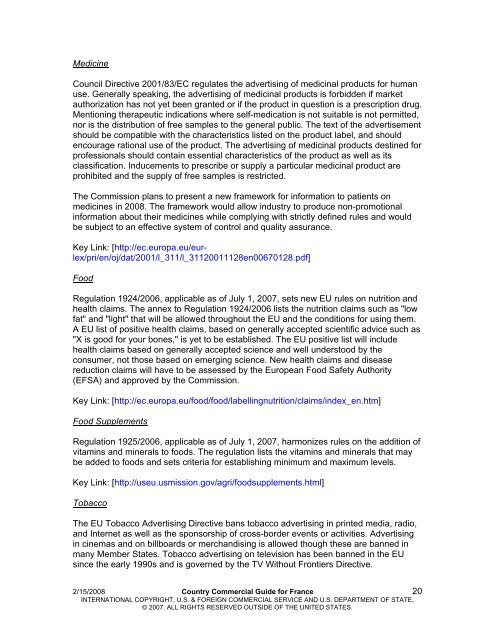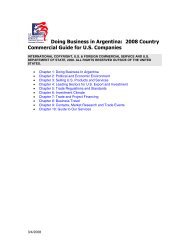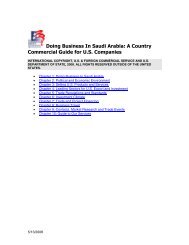Doing Business In (Insert Country Name Here) - BNA
Doing Business In (Insert Country Name Here) - BNA
Doing Business In (Insert Country Name Here) - BNA
You also want an ePaper? Increase the reach of your titles
YUMPU automatically turns print PDFs into web optimized ePapers that Google loves.
Medicine<br />
Council Directive 2001/83/EC regulates the advertising of medicinal products for human<br />
use. Generally speaking, the advertising of medicinal products is forbidden if market<br />
authorization has not yet been granted or if the product in question is a prescription drug.<br />
Mentioning therapeutic indications where self-medication is not suitable is not permitted,<br />
nor is the distribution of free samples to the general public. The text of the advertisement<br />
should be compatible with the characteristics listed on the product label, and should<br />
encourage rational use of the product. The advertising of medicinal products destined for<br />
professionals should contain essential characteristics of the product as well as its<br />
classification. <strong>In</strong>ducements to prescribe or supply a particular medicinal product are<br />
prohibited and the supply of free samples is restricted.<br />
The Commission plans to present a new framework for information to patients on<br />
medicines in 2008. The framework would allow industry to produce non-promotional<br />
information about their medicines while complying with strictly defined rules and would<br />
be subject to an effective system of control and quality assurance.<br />
Key Link: [http://ec.europa.eu/eurlex/pri/en/oj/dat/2001/l_311/l_31120011128en00670128.pdf]<br />
Food<br />
Regulation 1924/2006, applicable as of July 1, 2007, sets new EU rules on nutrition and<br />
health claims. The annex to Regulation 1924/2006 lists the nutrition claims such as "low<br />
fat" and "light" that will be allowed throughout the EU and the conditions for using them.<br />
A EU list of positive health claims, based on generally accepted scientific advice such as<br />
"X is good for your bones," is yet to be established. The EU positive list will include<br />
health claims based on generally accepted science and well understood by the<br />
consumer, not those based on emerging science. New health claims and disease<br />
reduction claims will have to be assessed by the European Food Safety Authority<br />
(EFSA) and approved by the Commission.<br />
Key Link: [http://ec.europa.eu/food/food/labellingnutrition/claims/index_en.htm]<br />
Food Supplements<br />
Regulation 1925/2006, applicable as of July 1, 2007, harmonizes rules on the addition of<br />
vitamins and minerals to foods. The regulation lists the vitamins and minerals that may<br />
be added to foods and sets criteria for establishing minimum and maximum levels.<br />
Key Link: [http://useu.usmission.gov/agri/foodsupplements.html]<br />
Tobacco<br />
The EU Tobacco Advertising Directive bans tobacco advertising in printed media, radio,<br />
and <strong>In</strong>ternet as well as the sponsorship of cross-border events or activities. Advertising<br />
in cinemas and on billboards or merchandising is allowed though these are banned in<br />
many Member States. Tobacco advertising on television has been banned in the EU<br />
since the early 1990s and is governed by the TV Without Frontiers Directive.<br />
2/15/2008 <strong>Country</strong> Commercial Guide for France 20<br />
INTERNATIONAL COPYRIGHT, U.S. & FOREIGN COMMERCIAL SERVICE AND U.S. DEPARTMENT OF STATE,<br />
© 2007. ALL RIGHTS RESERVED OUTSIDE OF THE UNITED STATES.












